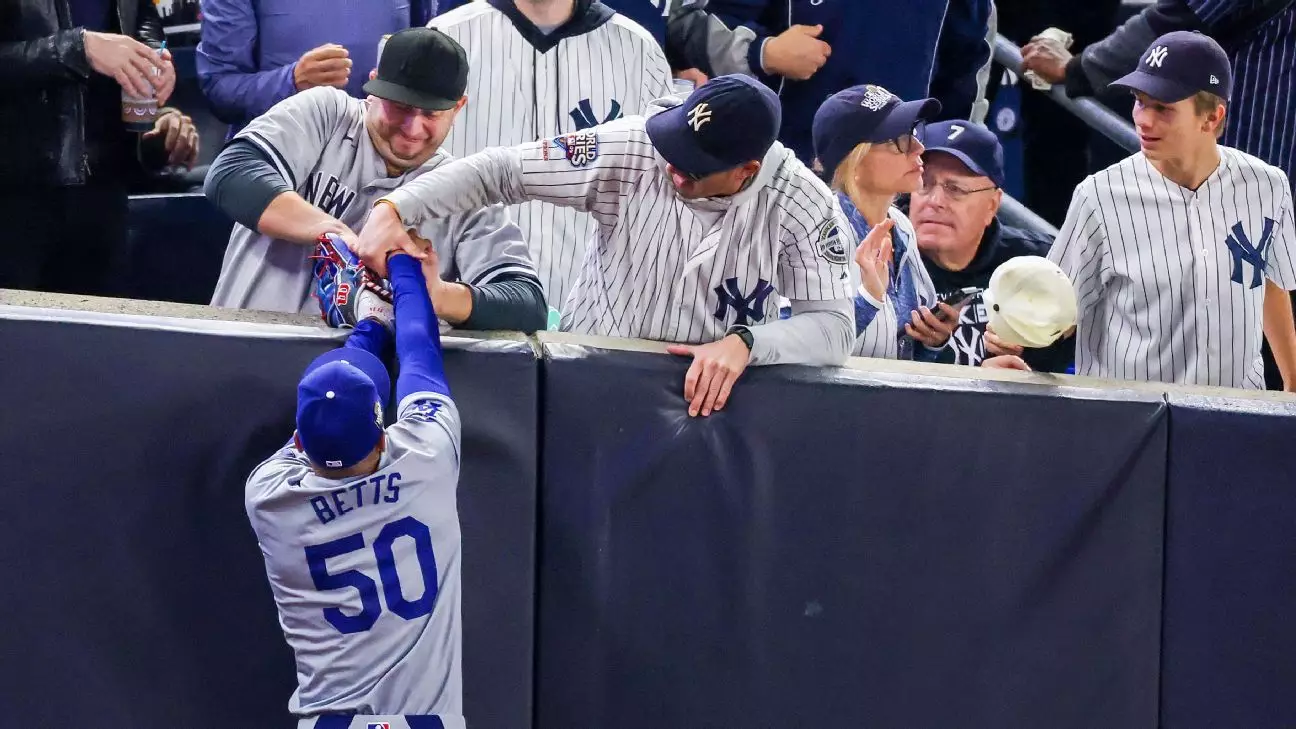In what should have been a thrilling showcase of athletic prowess and passion, Game 4 of the World Series took a dark turn when two fervent New York Yankees fans crossed a line, resulting in their immediate ban from attending Game 5. The offending fans, identified as Austin Capobianco and John Peter, made headlines not for their team spirit, but for an incident involving Los Angeles Dodgers star Mookie Betts. Their actions—grabbing Betts’ glove during a critical play—were met with outrage from the Yankees organization and the broader baseball community.
Such misconduct underscores an ongoing debate about the behavior expected from fans at live sporting events, particularly in high-stakes games like the World Series. The Yankees issued a statement categorizing the fans’ actions as “egregious and unacceptable,” highlighting the delicate balance between spirited support and respect for the players who entertain them.
The repercussions of this incident extend far beyond the immediate moment of fan interference. The Yankees emphasized player safety and the well-being of all individuals inside Yankee Stadium as foundational principles. This situation serves as a reminder that while fans are encouraged to embrace their enthusiasm for the game, impairing a player’s ability to perform jeopardizes not only the integrity of the game but also the physical safety of those on the field.
The team’s swift response, which saw the Game 5 tickets transferred to a young child battling illness, further underscored their commitment to maintaining a positive atmosphere at the ballpark. It illustrates a juxtaposition between irresponsible fan conduct and the profound impact of baseball on young lives, particularly during initiatives like Childhood Cancer Awareness Month.
The Major League Baseball Players Association (MLBPA) weighed in on the incident, with executive director Tony Clark stating the union would closely monitor both the league’s response and future protective measures for players. This commentary highlights a crucial aspect of sports culture: the evolving awareness around player safety. As professional sports have grown in popularity, so has the necessity for rigorous security measures on and off the field.
Clark’s statement also illuminates the dedication of the MLBPA to not only advocate for players but to actively participate in discussions about maintaining a safe environment in what should be an entertaining and uplifting context. This proactive stance on safety represents a significant cultural shift in professional sports, signifying that leagues are willing to take a hardline approach against any behavior that undermines the experience for players and fans alike.
Yankees manager Aaron Boone’s condemnation of the incident reflects broader sentiments within the baseball community. “There’s no place for that,” Boone asserted firmly, emphasizing the importance of maintaining a boundary between passionate support and inappropriate behavior. Boone’s remarks resonate with the general expectation that fans are there to cheer, not disrupt.
The reaction by Dodgers’ left fielder Alex Verdugo speaks volumes as well, as he acknowledged the “unique” fan culture in New York while dismissing the incident as potentially overblown. His perspective emphasizes a balance between celebrating passion and acknowledging when it crosses the line.
In a city known for its intensity and fervor, it is easy to understand how emotions can run high. However, as sport is ultimately about competition and respect, the encouragement of sportsmanship should take precedence over any individual act of zealotry.
Fan-induced disruptions in high-profile matches challenge the landscape of sports, highlighting a need for a cultural reset among spectators. While the enthusiasm of fans is an integral component of sports, it is crucial that such passion does not compromise the safety and integrity of the game. The Yankees organization’s decisive action serves as an important reminder: sports should unite people in celebration, not incite behavior that endangers players or diminishes the experience for everyone involved. It is essential for leagues, teams, players, and fans alike to contribute to a culture that values respect, ensuring that the essence of sport—competition, community, and safety—remains intact.

Leave a Reply